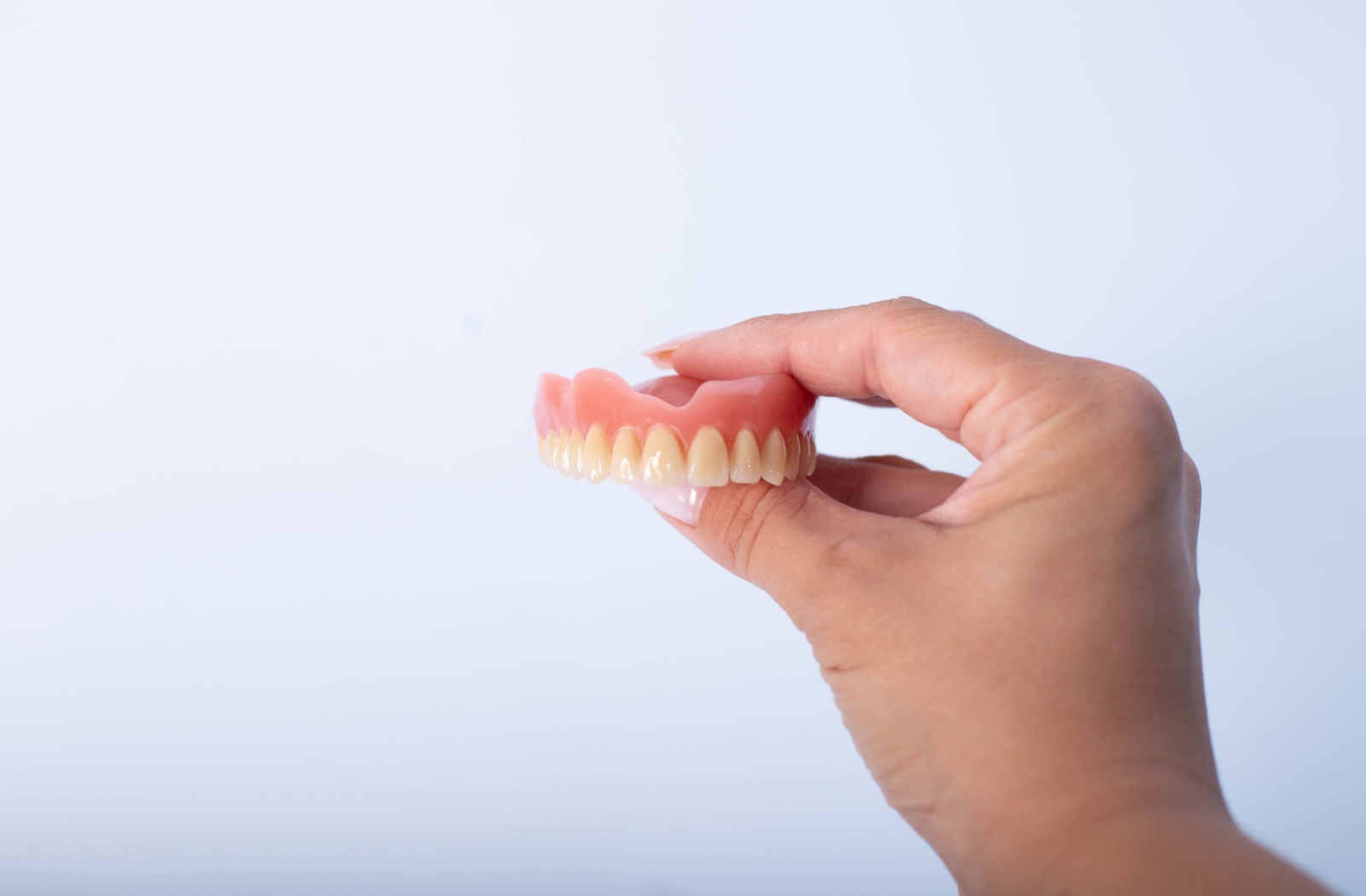Can Dentures Be Fitted to Receding Gums?

If you wear dentures and have receding gums, you may face challenges that make your daily life uncomfortable.
Dentures are removable prosthetic devices designed to replace missing teeth, providing function and appearance. However, when you have receding gums, the shrinking and reshaping of your gum tissue can affect how well dentures fit.
While dentures can be fitted to receding gums, they require extra care and expertise to ensure comfort and stability.
What Are Receding Gums?
Receding gums is a condition in which the gum tissue surrounding teeth wears away or pulls back, exposing more of the tooth or even its root. This can result in increased tooth sensitivity to hot and cold foods or beverages and may make teeth look longer than usual.
Receding gums can occur for various reasons, including poor oral hygiene, genetics, periodontal disease, or even aggressive tooth brushing. While they are common, they can be especially problematic for individuals who wear dentures—removable prosthetic devices designed to replace missing teeth.
Dentures work by sitting on the gums to restore function and appearance, but when gums recede, the exposed tooth roots and changes in gum shape can affect comfort and fit, leading to various challenges. Dentures may provide long-lasting stability for those with well-healed gums, offering a more secure fit and better functionality.
The Impact of Receding Gums on Dentures
If you have receding gums, you may face issues such as:
- Discomfort: The exposed tooth roots can make your gums more sensitive, which may cause discomfort when wearing dentures.
- Changes in fit: As your gums recede, the fit of your dentures may become looser or unstable. This can lead to denture slippage, making it difficult to speak, chew, or smile with confidence.
- Increased risk of infection: Poorly fitting dentures can irritate the gums, leading to sores and an increased risk of infection.
Receding gums can make your mouth more prone to discomfort and instability. However, this doesn’t mean you have to give up on wearing dentures.
Why Are Fitting Dentures to Receding Gums Challenging?
The process of fitting dentures for people with receding gums can be more complicated than traditional denture fittings due to several factors:
- Dynamic changes in gum shape: As your gums recede, their shape changes over time, making it challenging to maintain a long-lasting fit.
- Increased sensitivity: The exposed tooth roots make the gums more sensitive, making the fitting process more delicate.
- Bone loss: In many cases, receding gums are accompanied by bone loss in the jaw, further complicating the denture fitting process.
To ensure the best fit for your dentures, it's essential to work with an experienced professional who understands the complexities of fitting dentures to receding gums.

Techniques for Fitting Dentures to Receding Gums
Depending on your needs, the following options may be recommended to ensure a comfortable and secure fit:
1. Relining
Relining involves adding material to the inner surface of the denture to improve fit, comfort, and functionality. When the shape of your mouth changes due to receding gums, relining can help maintain a snug and secure fit. There are two main types of relining:
- Hard relining: A more permanent solution using hard acrylic to adjust the denture fit. Hard relining may be preferable for individuals with well-healed gums, as it offers long-lasting stability.
- Soft relining: Soft relining uses a flexible material that cushions the gums and provides added comfort, especially for those who experience discomfort or irritation from traditional denture materials.
2. Rebasing
Rebasing involves replacing the entire denture base while keeping the existing teeth intact. This process is especially useful if your denture base has worn down over time or the fit has become too loose due to receding gums. By redoing the base, we can ensure that the dentures fit more securely, reducing the likelihood of slippage and improving comfort.
3. Dental Adhesives
Dental adhesives can be a useful solution to fill the gaps created by receding gums. These adhesives, available in creams, powders, and strips, create a bond between your gums and dentures, helping to prevent slipping. While dental adhesives can help improve the fit, they may not be suitable for everyone, especially if the gum recession is more advanced.
4. Implant-Supported Dentures
For those with significant gum recession and bone loss, implant-supported dentures can be a great option. Dental implants involve surgically placing titanium posts into the jawbone, which then fuse with the bone over time. These posts act as artificial tooth roots, providing a stable foundation for dentures without relying solely on gum tissue. Implant-supported dentures can offer excellent stability and help preserve the jawbone's integrity.
Book Your Appointment Today!
If you’re struggling with receding gums and dentures, don’t let discomfort or instability affect your quality of life. At Hayven Dentures in St. Catharines, ON, our team is here to help you explore options and find the perfect solution for your unique dental needs.
Book an appointment today to get your dentures assessed and tailored to your specific needs. Our experienced team will guide you through the process and ensure you leave with a comfortable, well-fitting solution. We’re here to help you smile with confidence again!